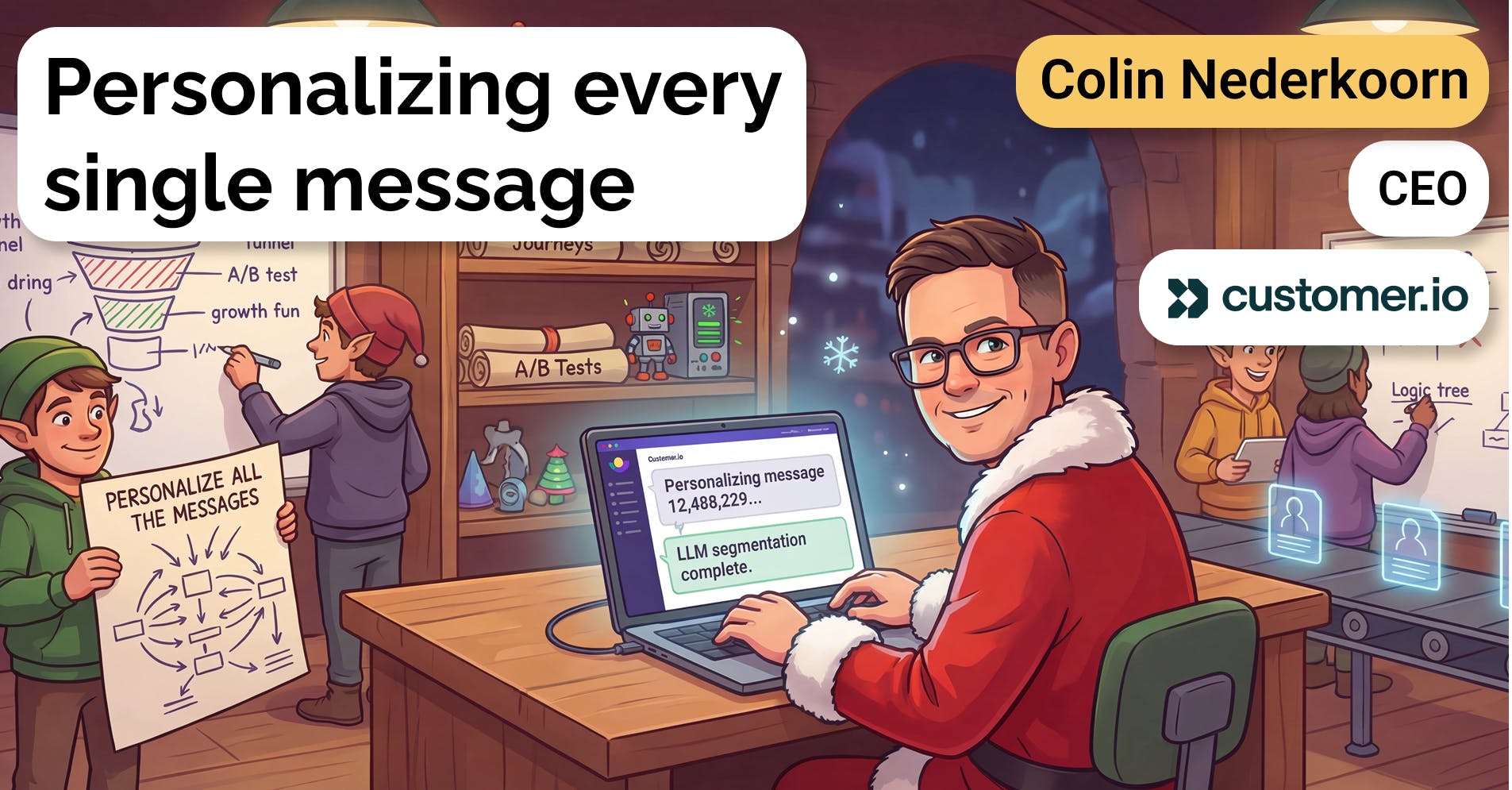James Kupczak, email and marketing automation specialist at MedBridge, on email code editors
 Jan-Erik Asplund
Jan-Erik Asplund

Background
James Kupczak is an email and marketing automation specialist at MedBridge. We talked to James about his tech stack for building, testing, and shipping custom-coded emails and the differences between email coding tools like Litmus and Parcel.
Questions
- Why Parcel? How'd you choose it as a product?
- What were you using before? Was it VS Code or some other IDE?
- What dictates which tool you use?
- How do you mean—is it in the sense that you would try to get paid seats through your company?
- How often are you going into VS Code or Parcel? What does the workflow look like—do you code up an email and Parcel or VS Code and then, export it, share it to Dropbox so marketers can look at it, offer suggestions, mess with copy, and then, it goes into your ESP?
- There's a code editor in Litmus. To what extent have you used it? Why do you prefer Parcel?
- Do you use a lot of VS Code extensions in your day-to-day activities?
- Any other thoughts on Parcel that come up? Ae there features that you’d like to see in the platform that aren’t there today?
- Did you write a script for that? I'm not sure if VS Code has a scripts format or if it was something separate.
Interview
Why Parcel? How'd you choose it as a product?
Parcel’s creator, Avi Goldman, frequents the Email Geeks Slack channel, which I do, as well. So even before it was public, I think, it was like Beta, maybe he was sharing the link around. I was probably one of the first people to try it out.
My day-to-day activities are all about building emails from Code—HTML, CSS—that I write myself. Just bouncing off to another platform that does that and is built for that was a pretty easy decision. I mean just what it does is exactly what I need for my day-to-day activity, so I was happy to sign up for an account right away. I've been using it ever since. I will say I am not a paid user. I suffice with the free account right now.
What were you using before? Was it VS Code or some other IDE?
I bounce back and forth between the two depending on what project I'm working on. I was using VS Code, exclusively. Nowadays, I’d say it's probably 60% VS Code, 40% Parcel.
What dictates which tool you use?
For my normal workflow at my primary job, it is mostly VS Code because we have all the HTML email files saved to a Dropbox that the entire organization has access to. Not that they really leverage it because I’m currently the only developer, but I do like what I've got. I've been working for this company for six years so, I have years and years and years worth of emails backed up as HTML files in this Dropbox that the whole company has access to.
I can't really do that with Parcel because Parcel's an online platform. I'd have to, if I wanted to leverage that kind of thing, pay for a Pro account or whatever it is. Then I'd have to get seats for people to access stuff. Today my company already pays for Dropbox, because the entire company uses Dropbox—whether they're email or not. It's just that sharing files that way is easier.
But in my freelance work that I do on the side, that really isn't a thing. I'll pick up a client, do an email for them, drop them, move on. I don't really have this repository that I neither need to keep up or feel like I want to keep up. So it's easier for me to just jump into Parcel really quick and just build out of there because as great as VS Code is, there’s stuff about Parcel that I enjoy such as, the option to click on part of the visual email and it scrolls me right to where that is in the code, which I don't really get with VS Code. I don't know if VS Code has an extension for that kind of thing, but it's definitely not built-in functionality. So to have that is probably one of the main reasons I use Parcel.
Another reason I use Parcel or that I don't use Parcel and is certainly probably something that maybe Parcel could become one day, is that, I worked at my company for five or six years and I've got building emails down to a science such that I've got scripts that I wrote myself where I'm building an email and it goes to five different segments of our database. Each of those segments have different landing pages and different verbiage, because you want to talk to those people differently than other people. I also have this script that I just run my email through and it recognizes, based on the file name, that this email goes to people who aren't subscribers to our platform. And this other email goes to people who are subscribers. It runs through the subscriber version. If it sees that I left verbiage that says, “Start for free. Subscribe today”, stuff that's not relevant to our subscribers, it highlights it in yellow, it dings me, and then, I'm able to go in and just fix it.
If the segment the email is for is physical therapist, but I'm accidentally linking to a landing page for athletic trainers, then, it processes all my links, says, "Hey! This is an athletic trainers landing page link. Why is it in your physical therapy email? Fix it." That kind of thing.
I don't know if Parcel does that, or if it doesn't right now, or it’s on the roadmap, but it’s good being able to automatically QA—because like everything I just described–I've got a team of people that click on every link, that read the entire email before it goes out. However, I always want a backup. So I just built this thing to automatically do the easy stuff like that, that can be done programmatically. If Parcel was doing that, I would probably move over there.
How do you mean—is it in the sense that you would try to get paid seats through your company?
Yes. I would use it more often than VS Code. It would be taking over what I've already done and I don't have to manage it. Parcel manages it. But then yes, if it were a Pro feature, I would be inclined to pay for Pro to get that kind of functionality and then, get seats for people to use the other functions that I don't have at all. The whole review process, feedback process that can happen in-platform.
Right now, when I’ve QA’ed an email, I send it out to everyone and then, they just Slack me their thoughts. But to have it on a platform would be nice. However, I don't do it because there are scripts that I have that speed up my QA process. That I don't think Parcel can do right now.
How often are you going into VS Code or Parcel? What does the workflow look like—do you code up an email and Parcel or VS Code and then, export it, share it to Dropbox so marketers can look at it, offer suggestions, mess with copy, and then, it goes into your ESP?
For my normal job, what happens is I've got a team of writers, designers, and project managers and they'll draft everything about the email in a Google slide deck. When it's done, it's approved by all managers and they pass it on to me.
Typically, our emails aren't that different from the previous one. We've got a set design for emails where we advertise an article versus a white paper versus a webinar. I'll just take an email previously that's very close to whatever design they've given me this time, copy it, swap out the headline, swap out the key art, the hero image, swap out the links they provide me, and then, it goes straight into the email platform, which today, is Pardot, and a month from now it's HubSpot. I'll put an email platform, send out, attest to everyone on the team who does our QA process, and then, I'll just tag them on Slack and say, "Hey! Use this thread. I just sent you an email. It's in your inbox. Give me your feedback and I'll make any fixes." When that's done, then we schedule it out to send.
For my main job, like I said, that's usually me building in VS Code because there are so many variations to our database that I need those tools that I built versus if I'm doing freelance work, which I do a lot of probably every other day. I'm doing some kind of freelance project, so I'm more inclined to use Parcel because it's like 1Z, 2Z. It's building one email for one company, one meeting for one company.
I don't have this giant rule set because I'm not building out for them, for their whole 10 segments. They've got one task for me, “Here are the links.” That makes it easier for me to just be like, “I don't need to use VS C, let me use Parcel.” Like I said before, clicking on a specific part to email is super fast and is great to hurry me along.
But workflow wise, yes, emails get proofed but via an email I send out of the platform. It's actually funny, I have one client where they build and do everything out of Litmus. I'll build in Parcel and then, I'll copy and paste to Litmus because I prefer Parcel.
There's a code editor in Litmus. To what extent have you used it? Why do you prefer Parcel?
Parcel has a lot more options. I know that it's built on Microsoft's code editor backend or whatever you want to call it. I've used Litmus enough to know it's not up to snuff by comparison.
I like that Parcel highlights MSO conditionals in something other than gray. Litmus, annoyingly, if you were to do Command F or Ctrl+F to find something in a document, it'll scroll you to it. But their little search bar where you type in what you want to search, covers it.
Then, I'm finding it and then, scrolling down manually to actually get where they meant for me to go. It's little things like that that just make it a subpar experience. I'd rather be in both VS Code or Parcel coding than in Litmus.
Do you use a lot of VS Code extensions in your day-to-day activities?
I use a few—HTML and CSS linters. Yes, ES lint, HTML hints, and accessibility linter—that I don't use. Actually speaking of accessibility, that's one thing that, even if I'm coding in VS Code, when I'm done, I'll copy and paste it into Parcel to run their accessibility feature, fix anything that it's highlighting and then, bring it back to VS Code. I've got a code spellchecker, some themes, and an open-end browser option.
Any other thoughts on Parcel that come up? Ae there features that you’d like to see in the platform that aren’t there today?
You've probably gathered this already, but the thing that would push me to go Pro is just more automated QA checks, being able to tell Parcel my links need to follow this pattern. If you see a pattern that doesn't equal what I've given you, throw me an error because then, I'm going to have an issue in the manual QA. But go ahead and automatically QA that for me.
If you see the text start for free, highlight that for me, because that shouldn't be in there. The writer's going to be like, "Hey! You forgot to update this thing. It says start for free. We're not supposed to say that." That kind of stuff.
I don't know if Parcel does any of that yet or if it's on the roadmap, but that's the kind of thing that would get me on because it really speeds up the QA process.
Did you write a script for that? I'm not sure if VS Code has a scripts format or if it was something separate.
No. Actually, I started working on that five or six years ago, and what it is is, Google Chrome extension. I code in VS Code and then, I open it in the browser. I'll have the browser view on my left window and VS Code in the right. When it opens in the browser, this Chrome extension runs, processes all of my code and then, loops through every link in the email before pushing out notices.
If any of them look wrong, it scans through all the texts and then, highlights text that is wrong. It makes sure all of my images are loading. If I have a rule that says, don't ever link to images from this CDN, make sure you're using this CDN, it notices that and it does that kind of thing.
What else?
It scans the preview text, the pre-header text in my email and it tells me how long it is. It says this is five characters long, or this is 200 characters long, you might want to keep it within this range. I was building tools to help me with the QA process that are very similar to the kind of stuff Parcel has, but years ago. I just never got around to building my own company. When Avi announced Parcel and showed it, I was like, "Dammit. If I had twice as much talent, I probably could have done this too," because five years ago I'm like, "Why isn't there a platform that is all about emailing or coding for emails?"
It's like at that point, Litmus existed of course, but I used and I'm like, “This is not exactly as good as it needs to be.” Then he came along with Parcel and I'm like, "This is exactly what I wanted." I want VS Code, but entirely focused on email production, email coding, all things email. Everything that I did for my personal stuff up until then was to try to get to that point. Parcel's great but there's just some stuff that I think is missing at this point.
Disclaimers
This transcript is for information purposes only and does not constitute advice of any type or trade recommendation and should not form the basis of any investment decision. Sacra accepts no liability for the transcript or for any errors, omissions or inaccuracies in respect of it. The views of the experts expressed in the transcript are those of the experts and they are not endorsed by, nor do they represent the opinion of Sacra. Sacra reserves all copyright, intellectual property rights in the transcript. Any modification, copying, displaying, distributing, transmitting, publishing, licensing, creating derivative works from, or selling any transcript is strictly prohibited.





